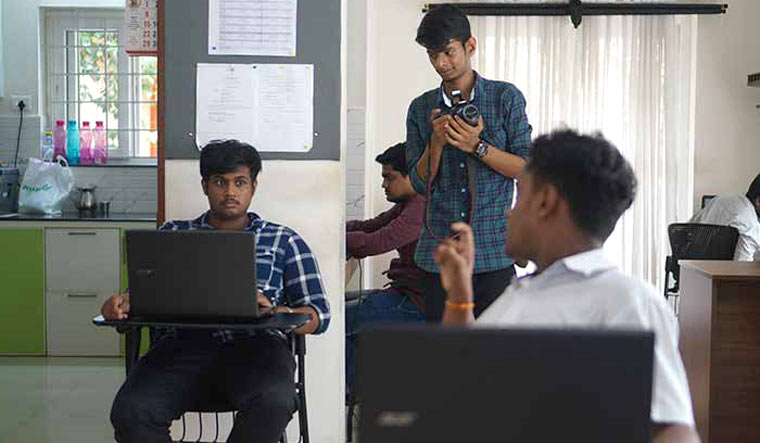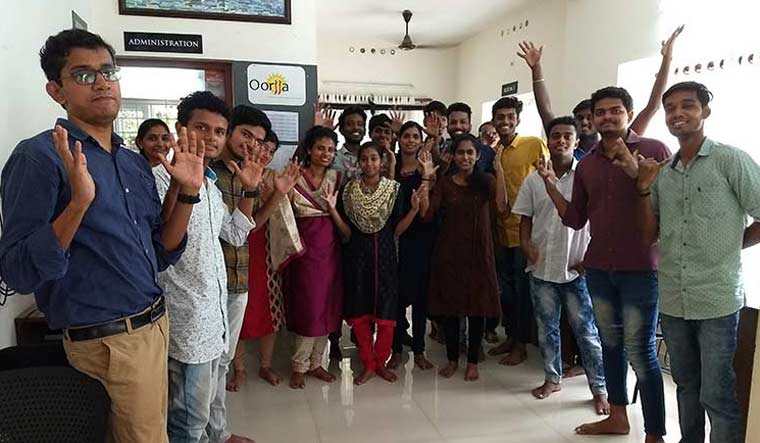Manu’s mother would be thrilled each year to see her son's photo in the newspaper every time he won awards or medals for his clay models and sometimes, for his sketches. “We are poor people, we did not even have place to keep all his trophies,” she recounts.
It did not help that Manu was afraid to even step outside his house. For a hearing-impaired boy who could not even communicate with his own mother, the world was a cruel and dangerous place.
But, for a family that relies on daily wages, medals were not enough. Manu needed work, and to find it, he took up a course in designing gold ornaments. It lasted three months, but he was unable to find a job. He finally found work, far away from home, at “the airport”, where he worked for six months under difficult conditions.
When his parents came to Oorjja, a Kerala-based organisation whose aim is to bring the differently abled into mainstream career, the reality of Manu’s job was not yet known. As Oorjja founder S.S. Jayasankar tells THE WEEK, the fact that the boy worked at the airport suggested that he was already in the mainstream. However, Manu's inability to communicate had led to a mix-up—it turned out that he had worked at a hotel in the airport, not with the airport itself. The long hours, difficult working conditions, and unfamiliarity made him deeply unhappy. But with few other avenues to make a living, he faced the same situation that millions of India’s differently abled do—a scarcity of opportunity.
Figures on India’s differently abled are not entirely known. The National Association for the Deaf estimates 18 million are hearing-impaired in India; the ‘2016 Disabled Persons in India: A Statistical Profile’ national sample survey estimated 5.07 million. But numbers are not as effective as data, which the 2012 Manual on Disability Statistics describes as “numbers in context”.
 Manu at the Oorjja centre in Ernakulam | via Oorjja
Manu at the Oorjja centre in Ernakulam | via Oorjja
Data on the total disabled demographic in India suggests that only a third of them of them are employed (36 per cent), with nearly twice as many men than women (47 per cent vs 23 per cent) having jobs. A 2011 International Labour Organisation (ILO) report found that 73.6 per cent of India’s disabled are outside the labour force. If the disabled already have problems, unemployment and gender disparities compound them.
Semantics on the disabled suggests that the word itself—‘disabled’—marks them out for a life without ability. This is the reason why some are calling for the words “differently abled” to be used instead. Linguistically, it can be easy enough to put such changes into practice. But practically? This is where organisations like Oorjja matter.
Oorjja, which has two centres in Ernakulam, strives to remove the element of pity from society’s view of the differently abled, starting with the hearing-impaired. The instructors do not use sign language when communicating with their students: they instead speak loudly and clearly, giving them a chance to learn lip-reading—a crucial skill for interacting with the “majority” world.
 Students at the Oorjja centre in Ernakulam | Varun Ramesh Balan
Students at the Oorjja centre in Ernakulam | Varun Ramesh Balan
It was not until Manu joined Oorjja that his parents could really communicate with him. “The sir at Oorjja taught him English. Even though he learnt it till 12th, he was not very fluent in it,” his mother says. He learned to communicate in other ways, verbally and non-verbally. Poignantly, she told Jayasankar that the six months after he had joined Oorjja marked the first time in 24 years that she was able to understand her son.
Moving into the mainstream requires more than just English. Confidence, just to take part in everyday activities, is also key.
Many of the students at Oorjja are initially dropped off to classes at the centre by their parents, who are hesitant about their kids travelling by themselves. Like Manu, Anjali was once hesitant to leave the house. She could not travel in buses by herself or even cross the road without help. As always, it is the parents who notice the biggest change. Anjali’s proud parents tell her teachers how she now travels alone, and how she is now the one helping them cross the road. Anjali now takes the bus.
Progress is gradual, but inevitable. Confidence-building is just one step, the next is training for the job. Oorjja’s mentors and staff comprise around 40 professionals who have worked in industry roles ranging from accountancy to UX/UI design to software and animation. They also arrange meetings between corporate recruiters and the students. It is not sold as a CSR programme. These are ready-for-work trainees.
P. Mathew Joseph, of Mathew and Saira Architects, has had an Oorjja alumnus working with his firm for the past eight months. He says, “My perception towards the differently abled has totally changed after I met people from Oorjja and after meeting Jay (Jayasankar).” He says his hire, Hima, has a good eye for detail. Within a short while, with her AutoCAD knowledge, she is already detailing engineering designs, with little guidance. “She [Hima] sits long hours at work and is constantly improving.”
also read
- Hola Mohalla: Celebrating martial arts tradition of Sikhs
- Here's the real mission behind B.Tech Paani Puri Wali's business
- G.N. Saibaba's story of hope is also a story of love
- 'We are going through the darkest times I have seen': G.N. Saibaba
- How a unique skilling mission is changing lives of neurodivergent youth
When asked whether he would now hire a hearing-impaired worker over a regular candidate, he says, "let me see, I am not against it. Door is always open. We will see when the next vacancy comes."
Jayasankar tells THE WEEK that 95 per cent of Oorjja’s students become breadwinners by the end of their course—usually, an outcome of internship programmes and campus placement tie-ups that see corporates vie for their students, who, as they have learned, tend to work harder than most freshers.
Manu’s story is one such example. After joining Oorjja, he struggled at first, like many students do in the beginning. The course is structured around the students, giving them leeway to discover themselves and their potential skill sets. If one is not good at Excel or at cracking competitive exams like the CAT (which an entire batch was training for when THE WEEK visited), alternative avenues are explored. A DSLR is one of the most-popular items at the centre, through the use of which several students have taken up photography and started Instagram pages. Manu soon proved adept at computer-aided design.
The idea of Oorjja is not to be an NGO but to be an ecosystem. The organisation does not take donations, preferring instead to form a self-sustaining model. Most students are able to pay their fees off themselves by the end of the course, through internships and part-time work they do during their life at Oorjja. Partner initiatives, like Kriya (Takshan Creatives), allow the company to make some revenue off the student’s increasing portfolio of skills, like photography, web design, accountancy, architecture, civil design, software development, animation, graphic designing and so on.
Azeem K. heads Eunoians Creative Studio, an animation studio that focuses on explainer videos and multimedia creations. Eunoians has been working with Oorjja from their very first batch. Abhijit, an alumnus from Oorjja, is now a full-time employee. Azeem says they didn't pick the students out of any CSR programme. "We select students based only on their talent. It is not a CSR initiative, only because of their talent and hard work."
Hike Messenger, an Indian messaging app, is one of their clients. If you ever use some of the app's "stickers", you could be using one of Abhijit's works.
If Oorjja’s model can work, it paves the way for Indian employers to make use of an untapped workforce. Software like Tally, MS Excel, CAD and Photoshop do not recognise disabilities, only hours of work and familiarity with the interface. Oorjja’s graduates are as good as anyone else when it comes to using software and delivering targets.
Manu now works at Terrakraft as a designer. He enjoys his work and his employers, too, like him. For his mother, the medal of the moment is his happiness at work and the feedback she hears from his boss. “It is nice to hear it when sir calls and says good things about him,” she says.
(With inputs from Neetha John)



